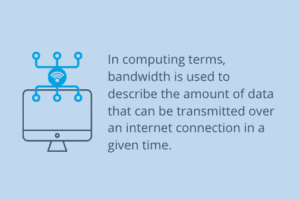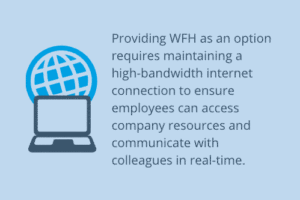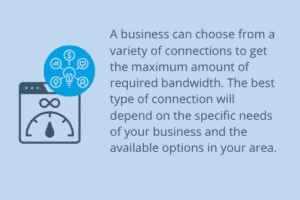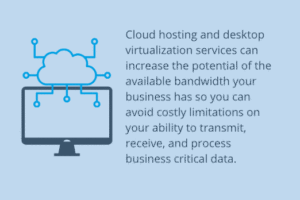
06 Feb Can Cloud Services Give You the Bandwidth You Need?
Small businesses can harness cloud hosting services and turn potential limitations into high-speed solutions to maximize information flow, data security, and processing capabilities.
What is Bandwidth?
 Maybe you’ve told a colleague or friend that you have “limited bandwidth” when you’ve been unable to handle a large work task or increased social demands due to stress, fatigue, or other factors.
Maybe you’ve told a colleague or friend that you have “limited bandwidth” when you’ve been unable to handle a large work task or increased social demands due to stress, fatigue, or other factors.
In computing terms, bandwidth is used to describe the amount of data that can be transmitted over an internet connection in a given time. The speed of transmission is measured in megabits per second (Mbps).
In both contexts, bandwidth refers to the amount of resources or capacity available to perform a particular task or function.
If you find yourself without sufficient bandwidth in any capacity, you can struggle to meet productivity demands in life and in the modern business environment.
What’s the Difference Between Bandwidth and Internet Speed?
Internet speed and bandwidth are often confused because they are related – yet distinctly different concepts.
To keep it simple, internet speed is the rate at which data is transmitted over the internet; bandwidth is the amount of data that can be transmitted over the internet in a given time.
The higher a network’s bandwidth, the more data that can be transmitted in the same amount of time versus the data capacity of a network with lower bandwidth.
A high bandwidth connection can handle more data, but that isn’t a guarantee of a high internet speed.
Your internet speed can also be affected by other factors such as network congestion, device performance, and the physical distance to the server.
How Does Low Bandwidth Affect Your Business Functionality?
With the continuing trend of remote working and telecommuting, businesses still must rely on and sufficiently support employees working from home.

If you frequently use video conferencing to communicate with remote teams or clients, those activities require high bandwidth to ensure clear video and audio quality. A low bandwidth connection can lead to buffering and poor quality, making it difficult to effectively communicate and collaborate with each other or to meet customer needs.
Cloud-based services can also require enough bandwidth to ensure that your critical data can be quickly and easily accessed and transferred.
Do You Have the Right Connection to Deliver Necessary Bandwidth?

Evaluate your specific needs and consult with internet service providers (ISP) to determine which type of connection is best for you. You want the most reliable and secure connection you can afford that meets your business objectives and demands.
Fiber-optic: Fiber-optic connection is considered the most reliable and secure type of internet connection available because they are less susceptible to interference. Fiber allows signals to travel faster over a longer distance. Fiber also is less likely to be affected by issues such as weather or physical damage. From a security standpoint, they are more challenging to tap.
Leased Lines: Leased lines are very reliable and secure. Your dedicated, private connection is leased from an ISP, and you are granted exclusive use of the connection. You’ll face less network congestion on a leased line which will improve your network performance.
You may also be able to supply your network with sufficient bandwidth by using a cable, DSL, or properly secured wireless network.
You’ll want to be sure that any internet connection is properly configured and maintained and using updated authentication methods to protect and encrypt your data whenever it is being transferred. Even a reliable and secure connection can be vulnerable to cyber-attacks and you should consider adding additional security measures like firewalls and conduct regular security audits.
Can Cloud Services Increase Available Bandwidth?

By securely storing data in the cloud, businesses can reduce the amount of data that needs to be transferred over their internet connection, which can free up bandwidth for other tasks.
Need Help Making Your Network More Robust, Increasing Business Productivity, Or Capping Escalating Technology Costs?
Our trained team of cloud computing experts can help you by developing the most secure and efficient cloud-based storage and processing solutions for your business.
Let us demonstrate exactly what Cyberlink can do for you – using your own data and workflows